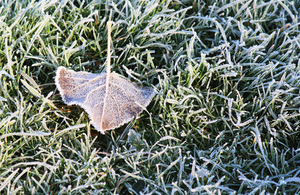Cold weather arrives
Health risks for vulnerable people may increase.

Frosty ground
Cold weather forecast by the Met Office has arrived and prompted Public Health England to repeat warnings to people to take extra care.
Meteorologists at the Met Office have issued a Level 3 alert which indicates that there is a very high likelihood of severe cold weather, icy conditions and heavy snow over the next few days, across North West England, North East England, Yorkshire and the Humber, West Midlands and East Midlands.
The rest of the country is at Level 2 alert, indicating that there is at least a 60% chance of these conditions in these areas.
This weather could increase the health risks to vulnerable people and PHE is urging everyone to keep an eye on weather forecasts and look out for vulnerable friends and neighbours over the cold snap.
Dr Angie Bone, head of Extreme Events at Public Health England, said:
Weather like this is not unusual for this time of year, but during very cold weather it’s important we take extra care to keep safe and healthy. We encourage people to keep an eye on the forecast and take the weather into account when planning activities over the following days.
We also advise people to keep active in the home, have plenty of warm food and drinks, and maintain indoor temperatures to at least 18°C, particularly the older or very young, people with pre-existing health conditions, or who are not very mobile. These groups can be particularly vulnerable to the ill-effects of cold.
Also take some time to think about how the bad weather may affect your friends, family and neighbours: it’s important we all do what we can to protect those around us.
If you do need to go out, remember to wear lots of thin layers and shoes with a good, slip-resistant grip to prevent any accidental falls.
The Cold Weather Plan for England sets out a series of actions that health and social care organisations, voluntary groups, and individuals can take and plan for cold temperatures to help reduce cold-related illnesses and deaths.
Ends
Notes to Editors:
Top tips to prepare for colder weather:
- look out for neighbours, friends and family who may be vulnerable to the cold and ensure they have access to warm food, drinks and managing to heat their homes adequately
- try to maintain indoor temperatures to at least 18°C, particularly for older or very young people, those with a pre-existing health condition and people who are not very mobile
- stay tuned for weather forecasts, ensure you are stocked with food and medications in advance: have deliveries or ask a friend to help
- wear a few layers of thin clothing rather than one thick layer, and when you need to go outside wear shoes with slip resistant, good grip soles
- take the weather into account when planning your activities over the following days
- claim entitlements and benefits vulnerable people can apply for if struggling to keep their houses warm, such as Winter Fuel Payments and Cold Weather Payments which are available
- avoid exposing yourself to cold or icy outdoor conditions if you are at a higher risk of cold related illness or falls
- discuss with friends and neighbours about clearing snow and ice from in front of your house and public walkways nearby, if unable to do yourself
- visit NHS Choices, and the Met Office’s Get Ready For Winter webpages for lots more useful advice
See more information about the Cold-Weather Alert system from the Met Office
Public Health England’s mission is to protect and improve the nation’s health and to address inequalities through working with national and local government, the NHS, industry and the voluntary and community sector. PHE is an operationally autonomous executive agency of the Department of Health. Follow us on Twitter @PHE_uk